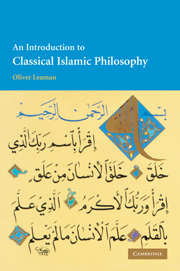Book contents
- Frontmatter
- Contents
- Preface to the first edition
- Preface to the second edition
- List of texts and abbreviations
- Introduction
- PART I AL-GHAZĀLĪ'S ATTACK ON PHILOSOPHY
- PART II REASON V. REVELATION IN PRACTICAL REASONING
- 4 Are the ethics of religion objective or subjective?
- 5 Happiness, philosophy and society
- 6 How to read Islamic philosophy
- Further reading
- Glossary
- Index of passages
- General index
5 - Happiness, philosophy and society
Published online by Cambridge University Press: 05 June 2012
- Frontmatter
- Contents
- Preface to the first edition
- Preface to the second edition
- List of texts and abbreviations
- Introduction
- PART I AL-GHAZĀLĪ'S ATTACK ON PHILOSOPHY
- PART II REASON V. REVELATION IN PRACTICAL REASONING
- 4 Are the ethics of religion objective or subjective?
- 5 Happiness, philosophy and society
- 6 How to read Islamic philosophy
- Further reading
- Glossary
- Index of passages
- General index
Summary
One of the themes which runs through the account of ethics in Islamic philosophy is the conflict between two kinds of ethical system. The moral life of human beings takes place on two different levels, one of which is secular, social, political and physical, while the other is spiritual and religious. When we think of Aristotelian ethics in terms of the doctrine of the mean then we are thinking of fulfilling the commandments and establishing appropriate rules of behaviour for our social life. When we think of moral behaviour in terms of intellectual union with God, in terms of moral and intellectual perfection, then we are concerned with the rules of behaviour appropriate to that spiritual end. As we have seen in chapter 4, there is often taken to be a progression of stages on the way to perfection, with the ultimate aim being knowledge of the supreme being. Once this knowledge is attained it is closely connected with the happiness of the knower ‘when he knew God with a certain knowledge, he admitted that true happiness, which is the knowledge of the deity, is guaranteed to all who know Him’ (GP III,23,492). Yet this state of knowing God can be interpreted in different senses. Is it a matter of something like personal knowledge? Does it require moral perfection first? Can only someone skilled in philosophy and demonstrative thought really know God?
- Type
- Chapter
- Information
- An Introduction to Classical Islamic Philosophy , pp. 174 - 190Publisher: Cambridge University PressPrint publication year: 2001



